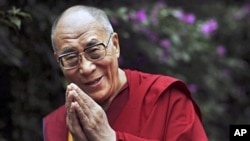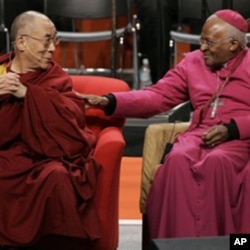Five months after applying, the Dalai Lama is still waiting to hear whether the South African government has granted him a visa to attend the 80th birthday celebration of fellow Nobel Peace laureate, Desmond Tutu.
A night vigil will be held at parliament in Cape Town to demand the government approve the visa.
Nomfundo Walaza, CEO of the Desmond Tutu Peace Center in Cape Town, says the government refused to keep the Center informed about the status of the Dalai Lama’s visa application, insisting it is a matter between the government and the Dalai Lama.
Ms. Walaza says the delays and silence demonstrate a lack of respect for both the archbishop and his guest.
“I think it is so sad at this time in our democracy, this is a constitutional state, this is a sovereign state, and we are not expecting our officials to treat somebody like the archbishop and the Dalai Lama with so much disrespect," said Walaza. "We are outraged that this is happening.”
The Dalai Lama visited South Africa three times between 1996 and 2004, and was welcomed to the country by former presidents Nelson Mandela and Thabo Mbeki. But two years ago, after President Jacob Zuma came to power, his fourth application was rejected.
The local organizing committee of the 2010 FIFA World Cup had invited the Nobel Peace Committee and the peace laureates to a conference to highlight the positive role of soccer in combating racism and xenophobia. When the Dalai Lama’s application was rejected, the Nobel committee and laureates withdrew in protest, forcing the cancellation of the conference.
In 2009, it was widely believed that the close relationship between Mr. Zuma and his African National Congress and the Chinese Communist Party played a significant role in the rejection of the Dalai Lama’s visa. This was denied by both the two parties and the two governments.
Once again, many South Africans are wondering if the Chinese government is exerting pressure or wielding influence in the government’s decision-making. Walaza says it is difficult to conclude anything else.
“You know, without an answer, unfortunately that is what civil society, and citizens of this country who have a right to know, will conclude," said Walaza. "It is a shame that you have to conclude without knowing because when the officials are being asked they say 'no, that [the Chinese government] is not where the pressure is coming from.' Then, if that is not where the pressure is coming from, why can't they put that in writing and say, these are the reasons.”
Clayson Monyela, spokesperson for the Department of International Relations and Cooperation, says there is no pressure from the Chinese government.
South Africa accounts for 20 percent of China's trade in Africa and the countries last year signed a strategic partnership agreement.
Two weeks ago, the government signed memorandums of understanding on geology and mineral resources and financial cooperation during a state visit by Deputy President Kgalema Motlanthe to China.





